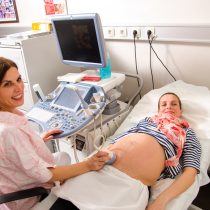Infertility in a marriage is a subject that is usually connected to women, while it is rarely said that men may often be found to be the main cause of infertility problems. The latest research actually shows that the number of men with infertility problems in Serbia became equal to the number of women, 40%, while in 10% of cases, infertility affects both partners.
Explaining the causes of male infertility and how it is successfully treated in Genesis, Dr Zorica Crnogorac says that women still bear the burden, that they are the first ones to start with thorough medical examinations, and if it turns out that everything is fine with them, then attention is directed at men.
- This conservative picture has started to change over the last few years, but not enough. There are cases when men self-willingly go to a urologist, undergo analyses, even before a woman starts with some serious evaluations, Dr Crnogorac Ilic states.
Most frequent causes and selection of the method of male infertility treatment
In 30-50% of cases there are irregularities in the sperm function. Hormonal disorders, chromosome mutations (for ex. Klinefelter syndrome), testicular tumor surgeries, chemotherapy, radiation, obstruction of reproductive channels, sexual disfunction, can temporarily or permanently affect the quality of sperm and prevent conception.
Other causes that should be mentioned include the way of life, followed by stress and hereditary diseases, such as obesity and diabetes. Age is a significant factor for reproductive capacity, especially of women, but also of men after the age of 45.
- The first and basic step in evaluating men’s infertility is a spermogram analysis. A normal sperm count is between 15 million and 200 million sperm per milliliter of semen, over 50% of sperm progressive mobility and over 50% of normal morphology.
Besides a spermogram, if it is necessary, a urologist may order clinical and ultrasound examinations, surgical interventions, hormonal analyses and testicular biopsies. One of the revolutionary methods in the male fertility treatment is a SAT test, that is an analysis of semen chromosomes, for which our hospital has been granted the exclusive right to use it, doctor explains.

What is SAT test?
Owing to SAT test it is possible to determine whether men with insufficient count
and quality of semen can become fathers by means of in vitro fertilisation.
SAT test provides detailed analysis of the chromosome number disorders in semen. It offers us obtaining useful information and personalized genetic counselling in infertile couples before the beginning of in vitro fertilisation.
– Couples with pathological findings of SAT are mandatorily recommended to also perform PGS embryo testing, which insures selection of embryos with healthy chromosomes for fertilisation, enhances chances for pregnancy and decreases the risk of miscarriagies.
In cases of azoospermia (spermatosoa do not appear in the ejaculate), it is not possible to perform analysis of chromosome disorders of semen by SAT, due to very small count of spermatosoa obtained after punction. In spite of that, male partners with that type of male infertility can become parents, as was proven with many couples in our hospital over the last ten years, DR Crnogorac concludes.
Can men use some kind of hormonal therapy?
According to Dr Crnogorac Ilic, hormonal therapy in case of male factor infertility is administered when there is a very small number of spermatosoa in the ejaculate (below 1 million in one milliliter) and in case of azoospermia, but only when some other findings are within normal range, such as the caryotype, microdeletion of Y chromosome, hormonal level, excluded testicular cancer and testicular atrophy and when there were found mature forms of speramtogenesis by diagnostic punction of testicles.
All additional information about the infertility treatment, IVF process, as well as about available dates for medical consultations, can be obtained by making a phone call: +381 21 549 444, +381 21 549 777, +381 60 549 444 1 or by E-mail bolnica@genesis.rs






